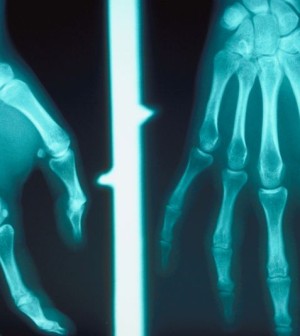- EPA Earmarks $3 Billion to Replace Lead Pipes Nationwide
- Johnson & Johnson Will Pay $6.5 Billion to Settle Talc Ovarian Cancer Lawsuits
- No Sign of Bird Flu in Ground Beef, USDA Says
- U.S. Maternal Deaths Declined in 2022
- Economy, Election Spur Rising Anxiety Among Americans in 2024
- Day Care Pick-Up Often Involves Sugary Snacks, Study Finds
- A Third of Young Adults Still Believe ‘Tan Is Healthier’ Myth: Survey
- MRNA Vaccine Fights Deadly Brain Tumor in Small Trial
- AI Won’t Replace ER Doctors Anytime Soon: Study
- Sleep Apnea Linked With Late-Life Epilepsy
Many Take Opioids Months After Hip, Knee Replacements

A significant number of patients continue to take powerful prescription opioid painkillers many months after joint replacement surgery, a new study shows.
The findings are important because joint replacement surgery is increasingly common and there are sharply rising rates of opioid overdoses in the United States. Common prescription opioid painkillers include drugs such as OxyContin, Vicodin and Percocet.
In fact, an autopsy report released Thursday showed that music legend Prince died in April after taking fentanyl, a powerful synthetic opioid painkiller. The artist was said to have suffered from severe hip pain after years of performing intense acrobatics during his shows.
For the new study, researchers looked at 574 patients undergoing knee or hip replacement surgery. About 30 percent of the patients were taking potentially addictive opioid painkillers before their surgery. Among this group, 53 percent of knee patients and 35 percent of hip patients were still taking the narcotics six months after their surgery.
The investigators also found that among patients who did not take opioids prior to having surgery, 8 percent of knee patients and 4 percent of hip patients were still taking the painkillers six months after receiving their joint replacement.
The strongest predictor of long-term opioid use among the study participants was taking high doses of the drugs before joint replacement surgery, the study authors said.
The results suggest that some patients continue to use opioids despite improvements in their hip or knee pain.
Also, some patients who did not use opioids before joint replacement will become chronic users after the surgery. And continued narcotic painkiller use after joint replacement surgery is more common than previously believed, said researcher Jenna Goesling, from the University of Michigan in Ann Arbor.
Goesling and colleagues published their report in the June issue of the journal Pain.
One long-term goal in pain management for joint replacement patients is to find ways to help patients stop using opioids after their surgery, the researchers said in a journal news release.
More information
The U.S. Department of Health and Human Services has more about opioids.
Source: HealthDay
Copyright © 2024 HealthDay. All rights reserved.










